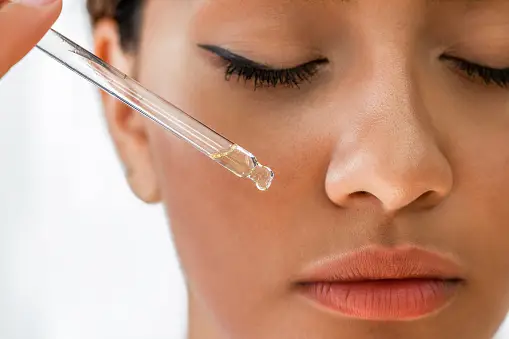Vitamin B12, also known as cobalamin, is an essential nutrient that plays a crucial role in various bodily functions, including the formation of red blood cells, DNA synthesis, and nerve function. While vitamin B12 is important for overall health, excessive intake of B12 usually doesn’t lead to significant adverse effects, especially concerning the skin.
However, extremely high levels of B12, often caused by excessive supplementation, might potentially lead to certain skin reactions or issues, although these are rare. Some potential skin-related effects of excessive B12 intake might include:
- Acne: There have been a few anecdotal reports of people experiencing acne outbreaks with excessive B12 supplementation. However, scientific research is limited in this area, and the exact mechanisms linking B12 to acne are not well understood.
- Rosacea Flare-Ups: Some individuals with rosacea, a chronic skin condition that causes facial redness and sometimes small, pus-filled bumps, have reported flare-ups or worsening symptoms after taking high doses of B12. Again, more research is needed to understand the relationship between B12 and rosacea.
- Allergic Reactions: In rare cases, people might develop an allergic reaction to B12 supplements, which could manifest as skin rashes, hives, or itching.
It’s important to note that the recommended dietary allowance (RDA) for B12 varies by age and life stage, but generally ranges from 2.4 to 2.8 micrograms per day for adults. Most people can obtain sufficient B12 through a balanced diet that includes animal products (meat, fish, dairy) or fortified foods.
If you suspect you are experiencing skin issues related to excessive B12 intake, it’s advisable to consult with a healthcare professional. Additionally, if you’re considering taking B12 supplements, it’s a good idea to talk to a healthcare provider to determine whether supplementation is necessary and at what dosage.

Can I take vitamin D and B12 together?
Yes, it’s generally safe to take vitamin D and vitamin B12 supplements together. In fact, these two vitamins play distinct roles in the body and are not known to interact negatively with each other. Here’s a bit more information about each vitamin:
- Vitamin D: This vitamin is important for maintaining bone health, regulating calcium and phosphorus levels, supporting the immune system, and influencing various other bodily functions. Vitamin D is often referred to as the “sunshine vitamin” because the skin can produce it when exposed to sunlight. However, many people may not get enough sunlight exposure and might need to supplement their vitamin D intake, especially during the winter months or if they have limited sun exposure.
- Vitamin B12: Vitamin B12 is crucial for red blood cell formation, DNA synthesis, nerve function, and other metabolic processes. It’s primarily found in animal products, so individuals following a vegetarian or vegan diet might need to consider supplementation to ensure they’re getting enough B12.
If you’re considering taking both vitamin D and vitamin B12 supplements, here are a few tips:
- Consult a Healthcare Professional: Before starting any new supplement regimen, it’s a good idea to consult with a healthcare professional. They can assess your individual health needs, recommend appropriate dosages, and ensure that taking these supplements won’t interfere with any existing medical conditions or medications you might be taking.
- Choose the Right Dosages: The recommended dosages for vitamin D and vitamin B12 can vary based on factors such as age, sex, health status, and dietary habits. Your healthcare provider can guide you on the appropriate dosages for your specific situation.
- Consider Multivitamins: If you’re interested in taking multiple vitamins and minerals, you might also consider a multivitamin supplement that provides a balanced combination of nutrients. However, be cautious not to exceed recommended daily allowances, as excessive intake of certain vitamins and minerals can have adverse effects.
- Monitor Your Health: While both vitamin D and B12 are generally safe in appropriate dosages, it’s important to pay attention to any changes in your health or how you feel after starting supplementation. If you experience any unusual symptoms or side effects, consult your healthcare provider.
Remember that a balanced diet rich in a variety of nutrient-dense foods is the best way to obtain the vitamins and minerals your body needs. Supplements should be used to complement a healthy diet and fill in nutritional gaps when necessary.
Should I take B12 in the morning or at night?
That being said, you can choose to take your vitamin B12 supplement at a time that fits your routine and preferences. Here are a few considerations:
- Consistency: It’s often recommended to take supplements at the same time each day to establish a consistent routine. This can help you remember to take them regularly.
- With or Without Food: Vitamin B12 supplements can generally be taken with or without food. Some people find it more convenient to take their supplements with a meal, while others prefer to take them separately.
- Personal Preference: Some people might find that taking vitamin B12 in the morning works well for them, while others might prefer taking it in the evening. Consider your daily schedule and whether you’re more likely to remember to take the supplement at a specific time.
- Potential Energizing Effect: Some individuals report feeling a slight boost in energy after taking B12 supplements, though this effect is generally not strong. If you’re concerned about any potential energy-boosting effect interfering with your sleep, you might consider taking it earlier in the day.
- Consult Your Healthcare Provider: If you have any specific health conditions, medications, or dietary considerations, it’s a good idea to consult your healthcare provider about the best time to take your vitamin B12 supplement.
Ultimately, the timing of your vitamin B12 supplement is a matter of personal preference and convenience. The most important thing is to take it regularly as recommended by your healthcare provider to ensure you’re meeting your dietary needs.
